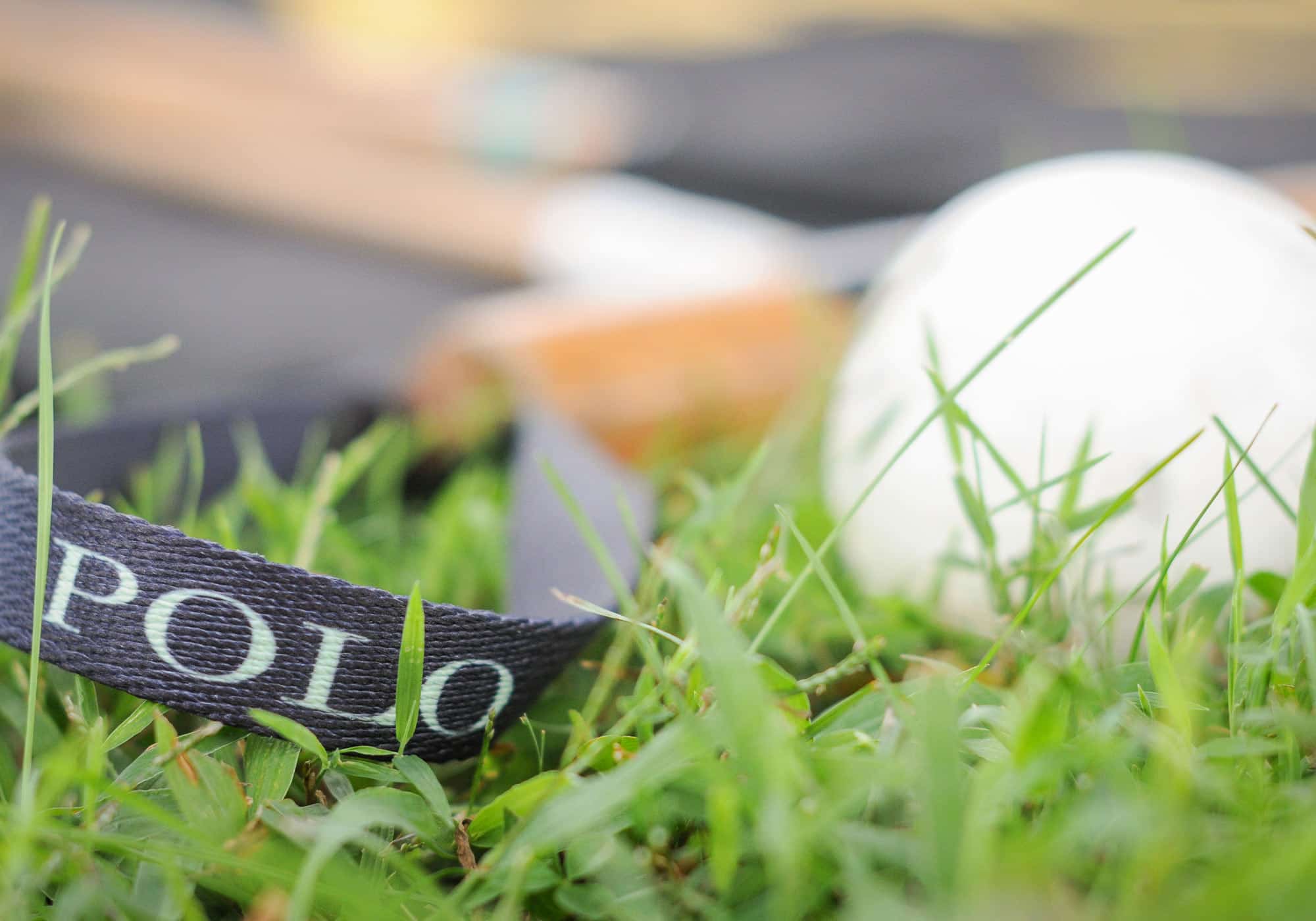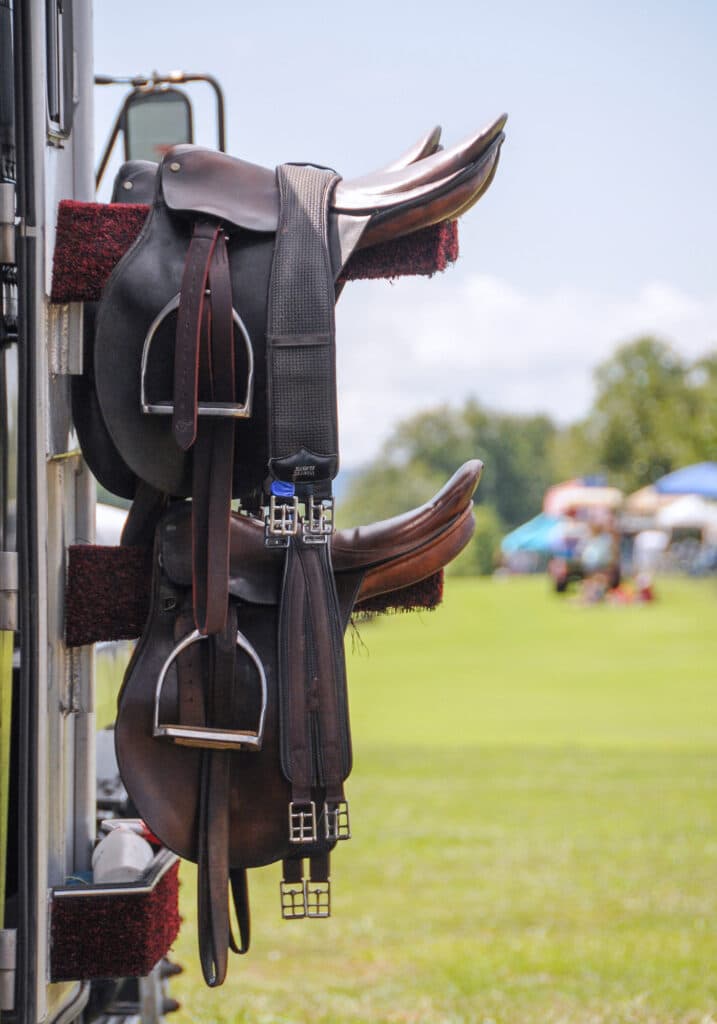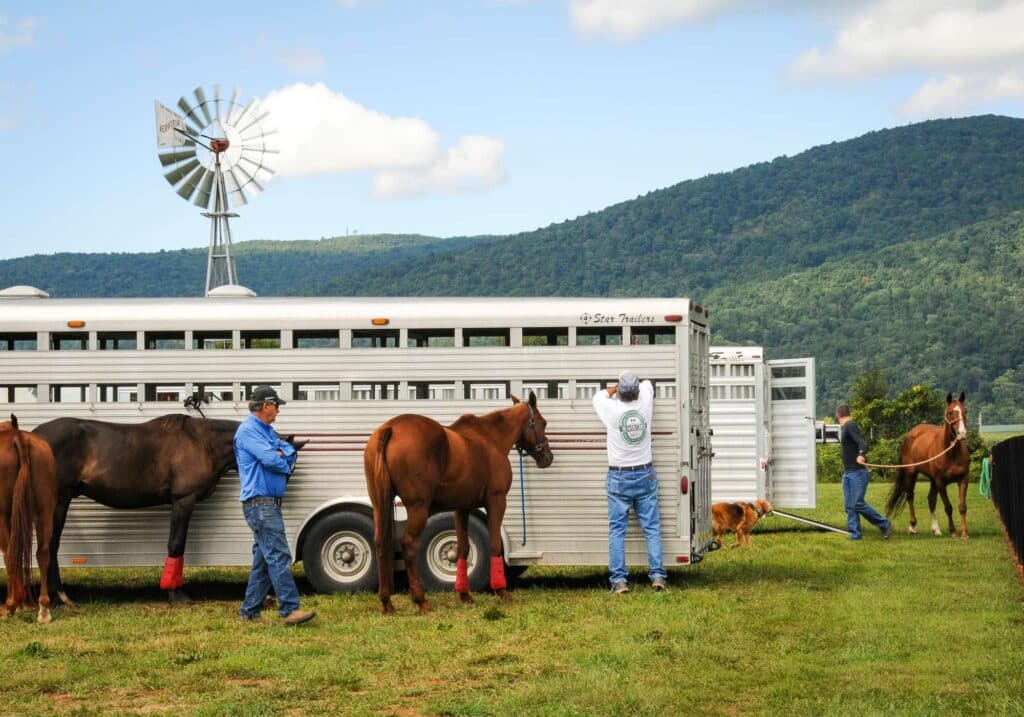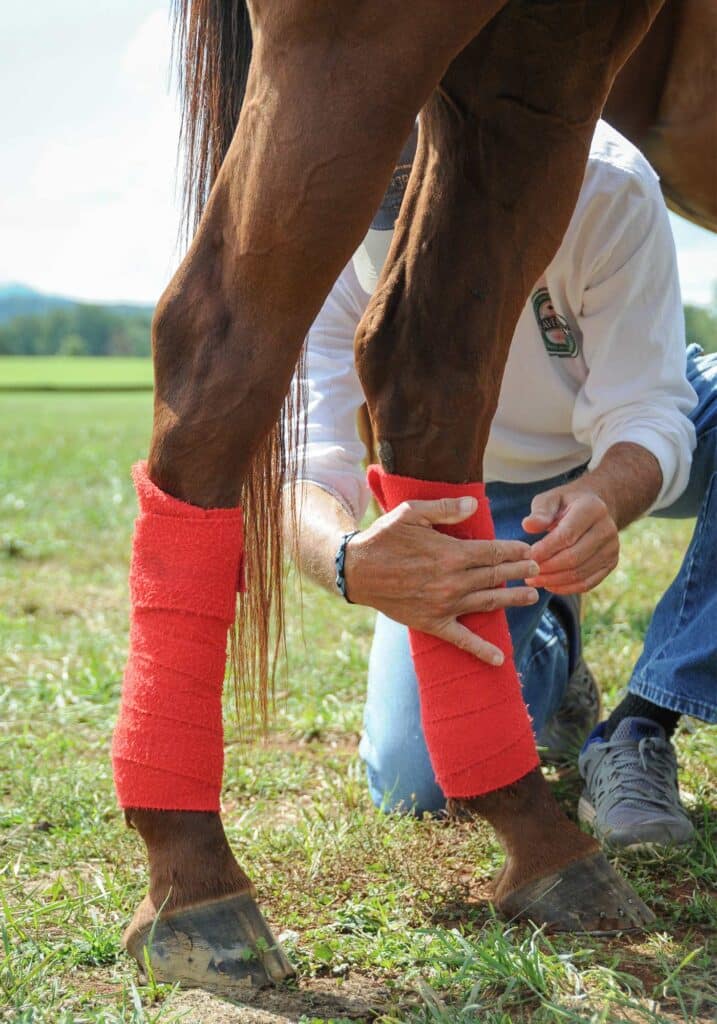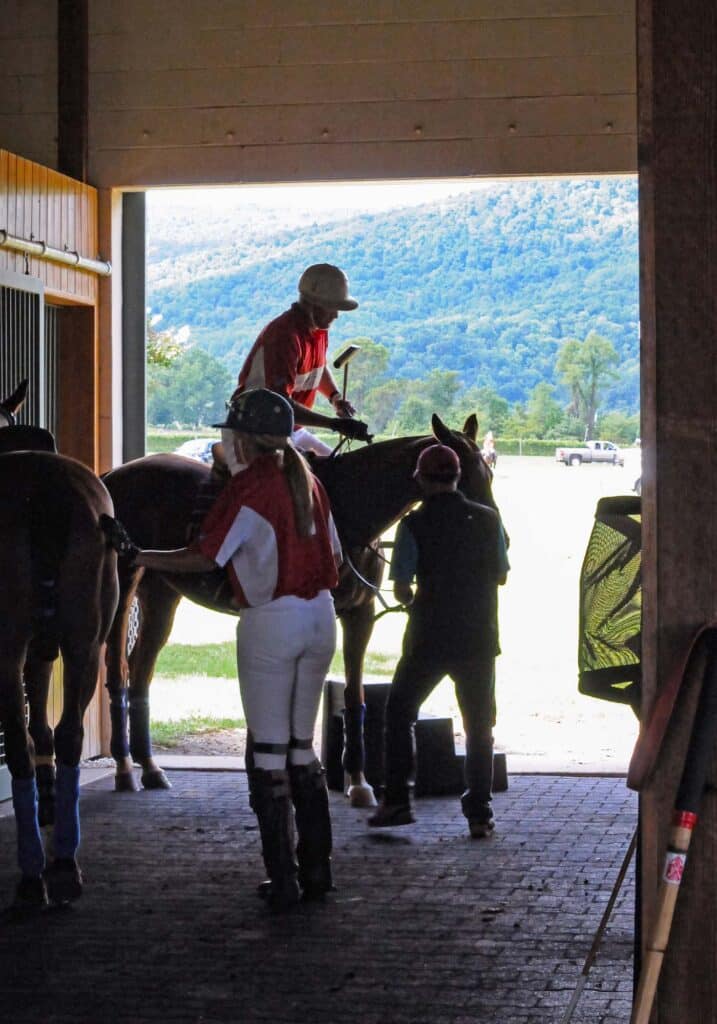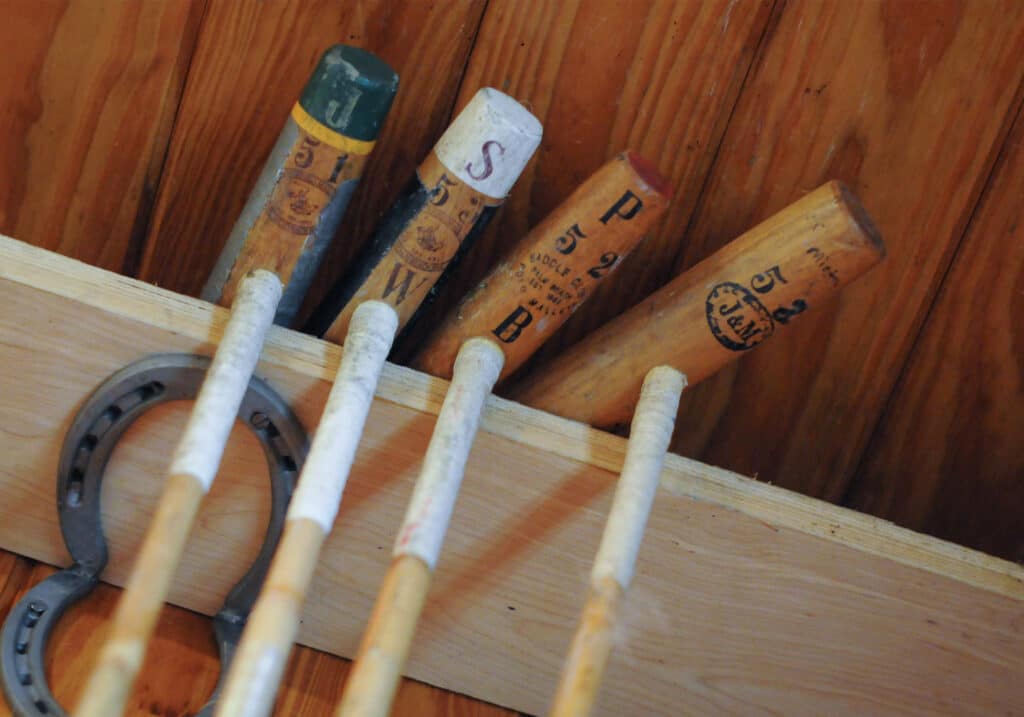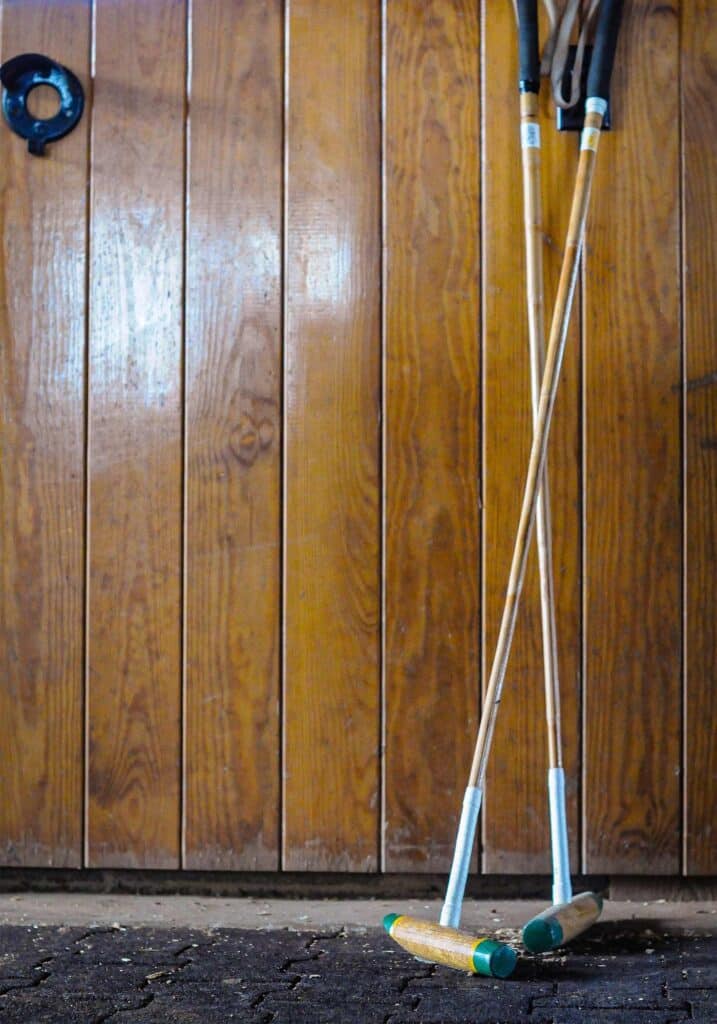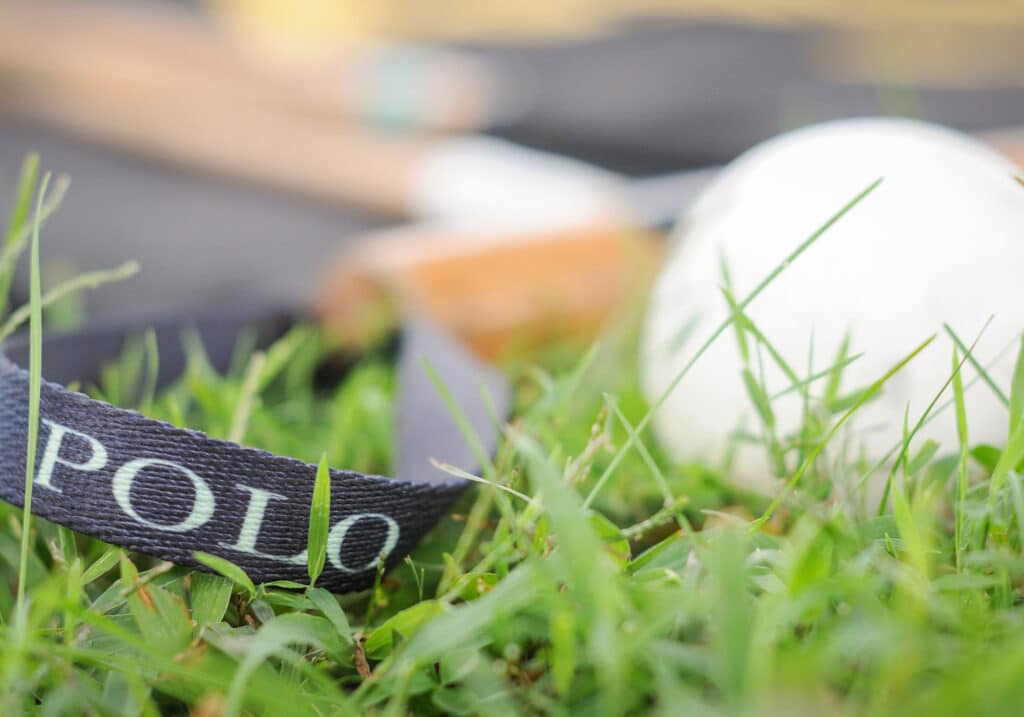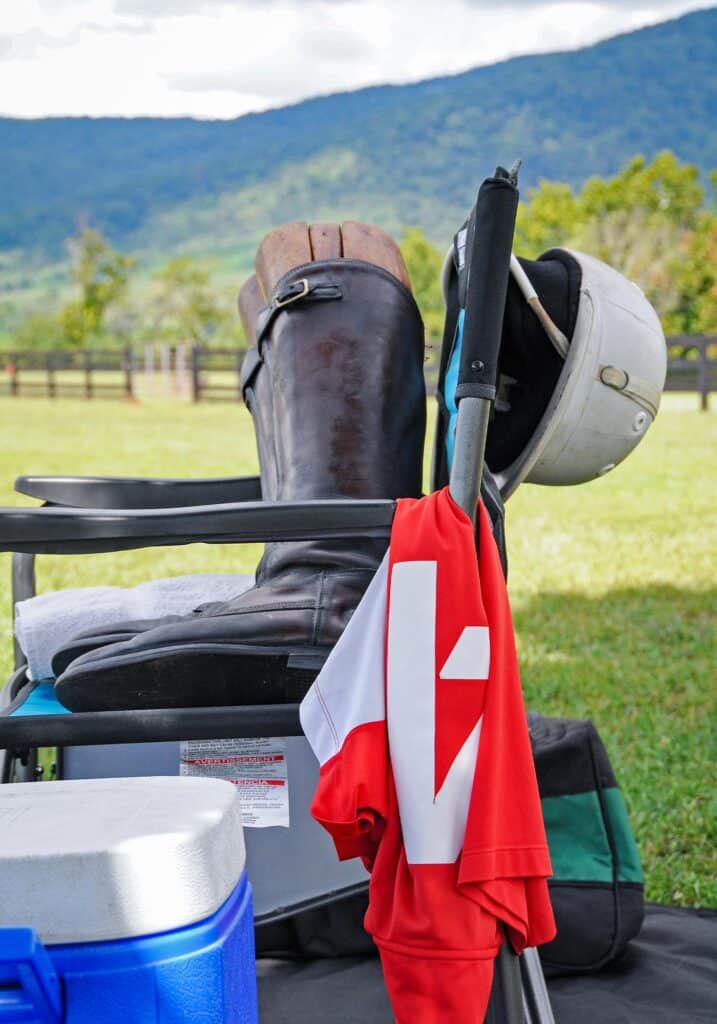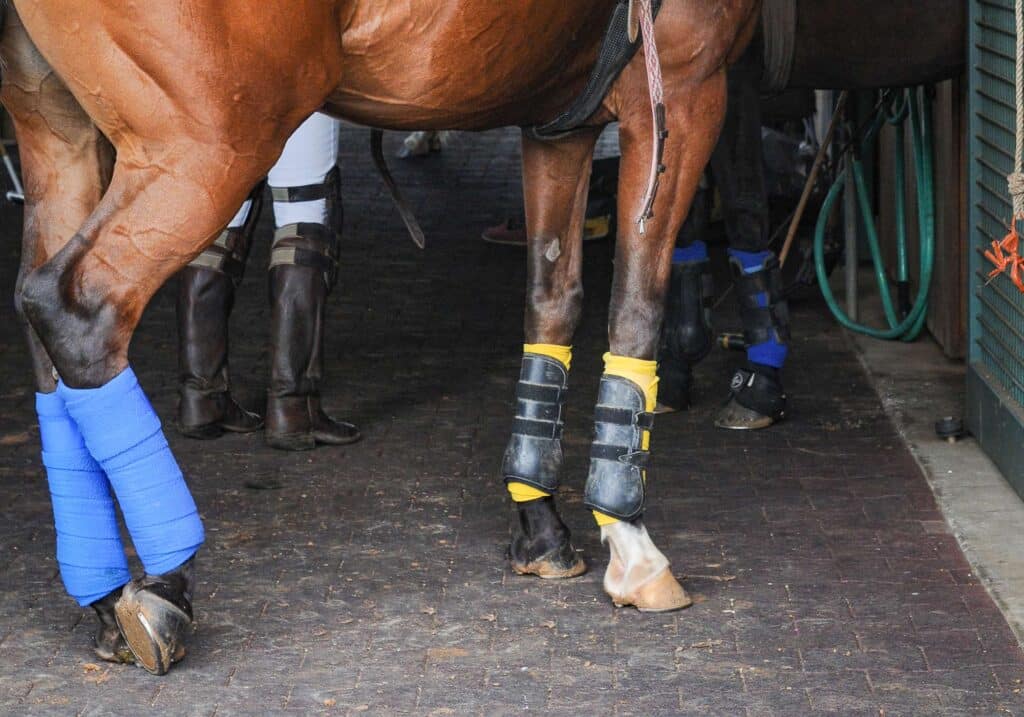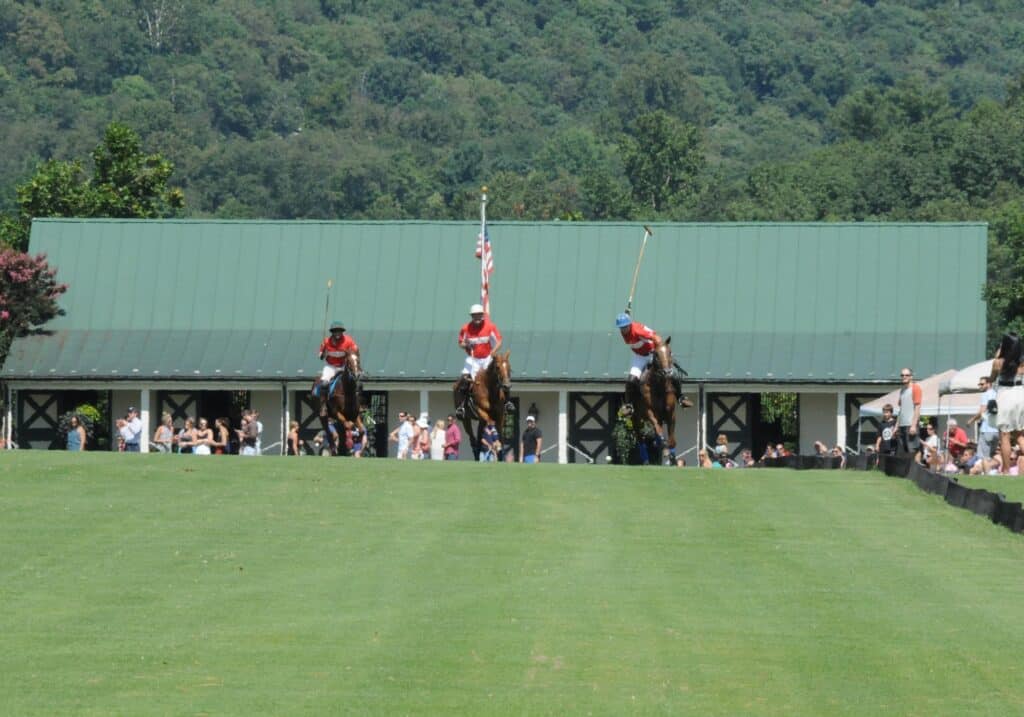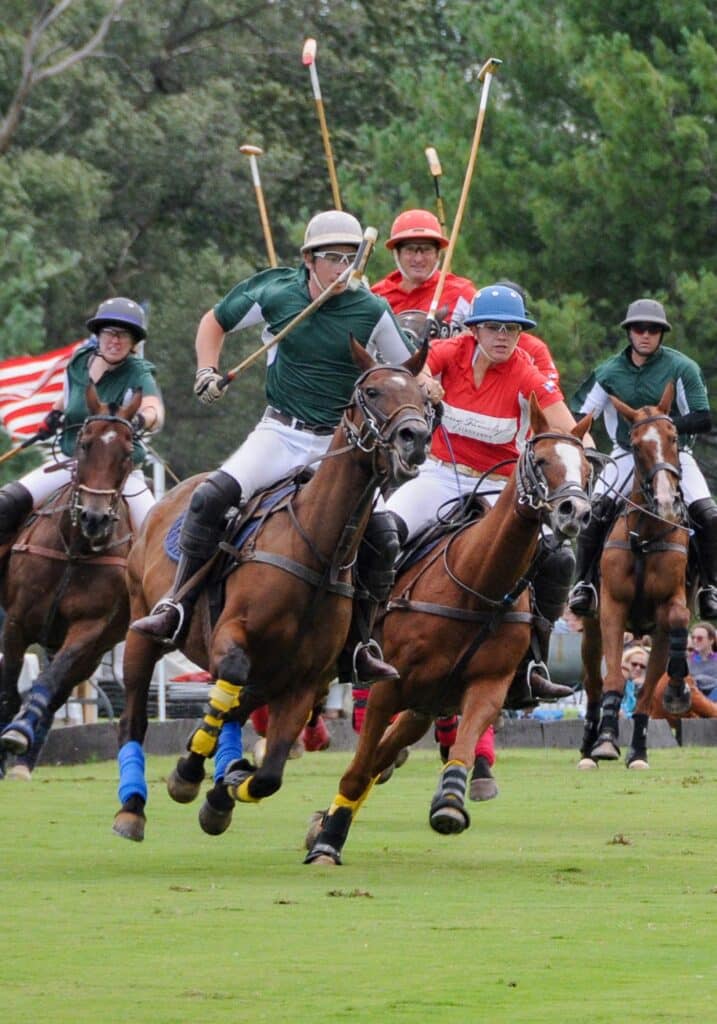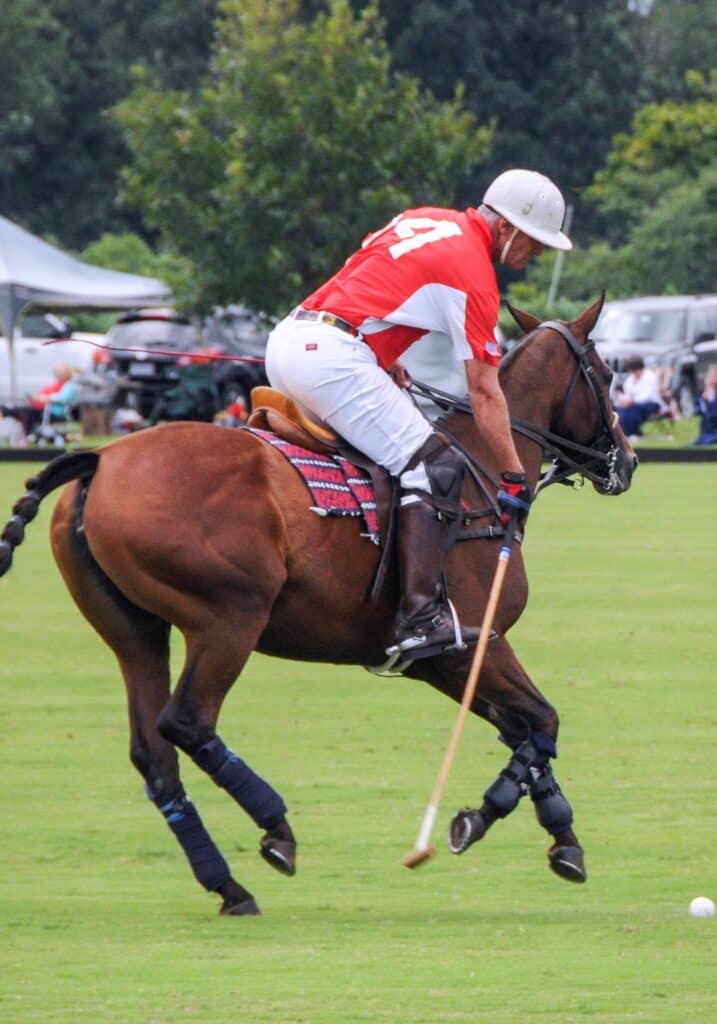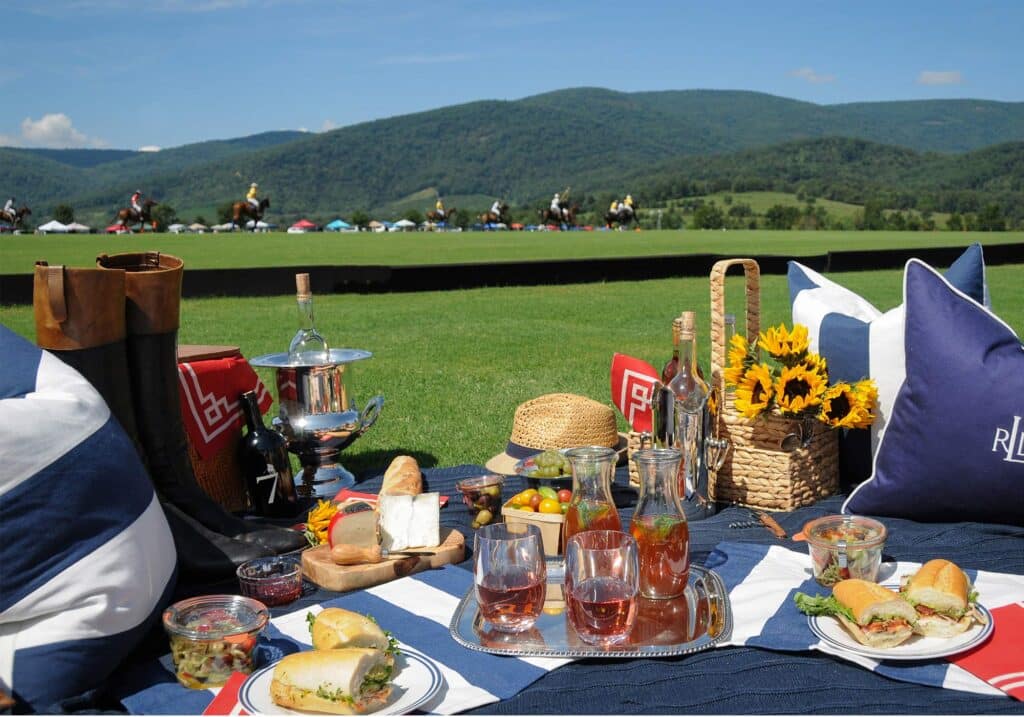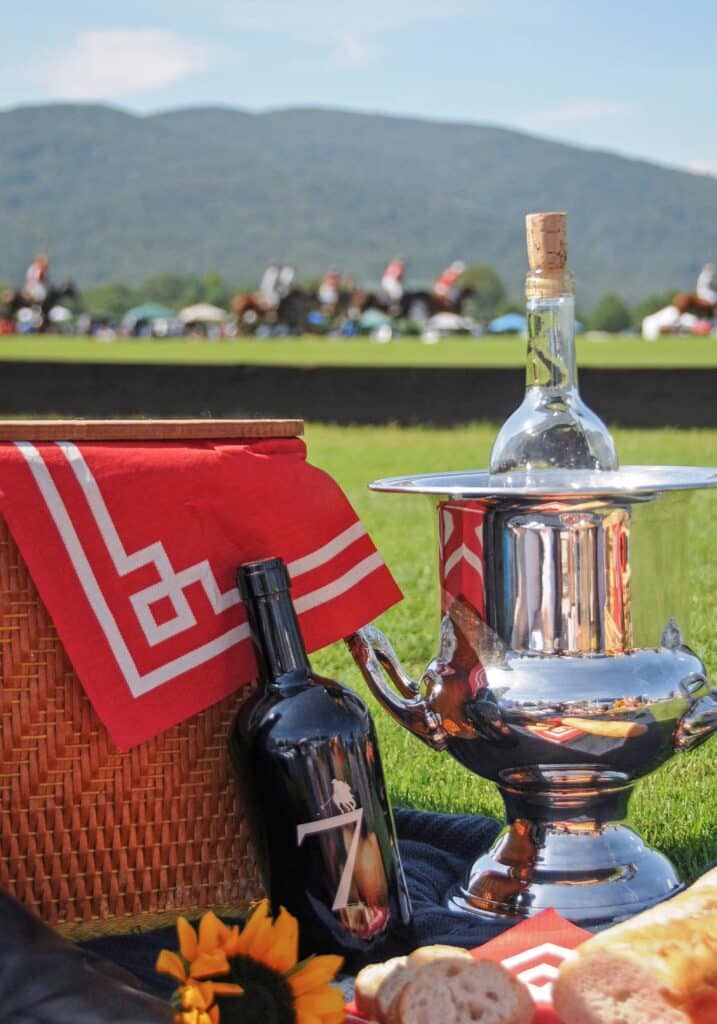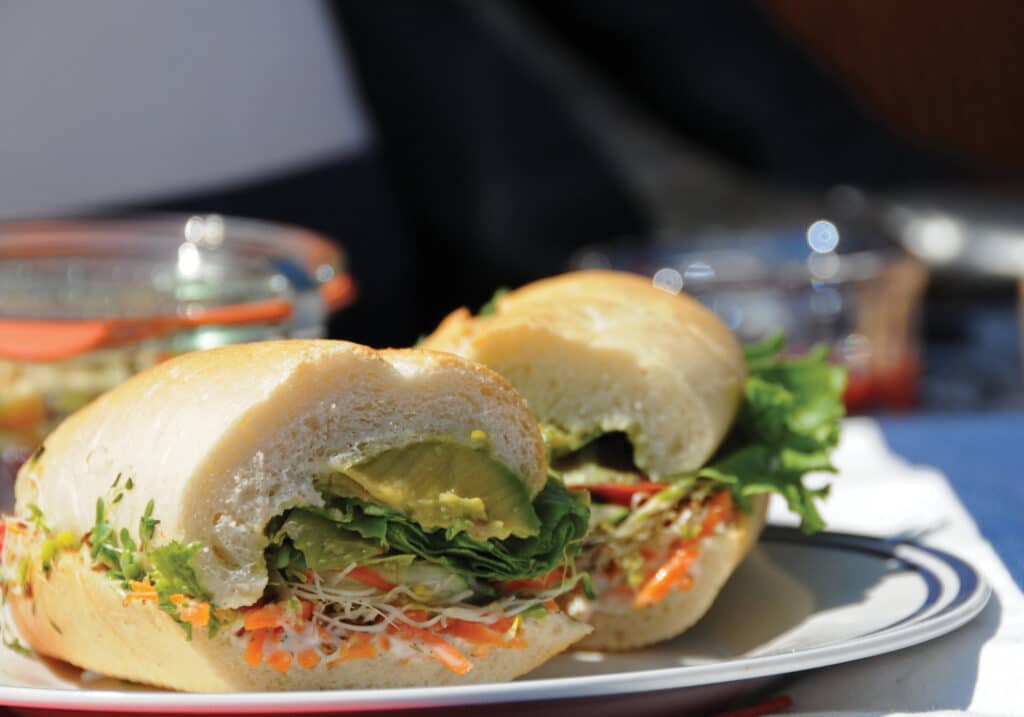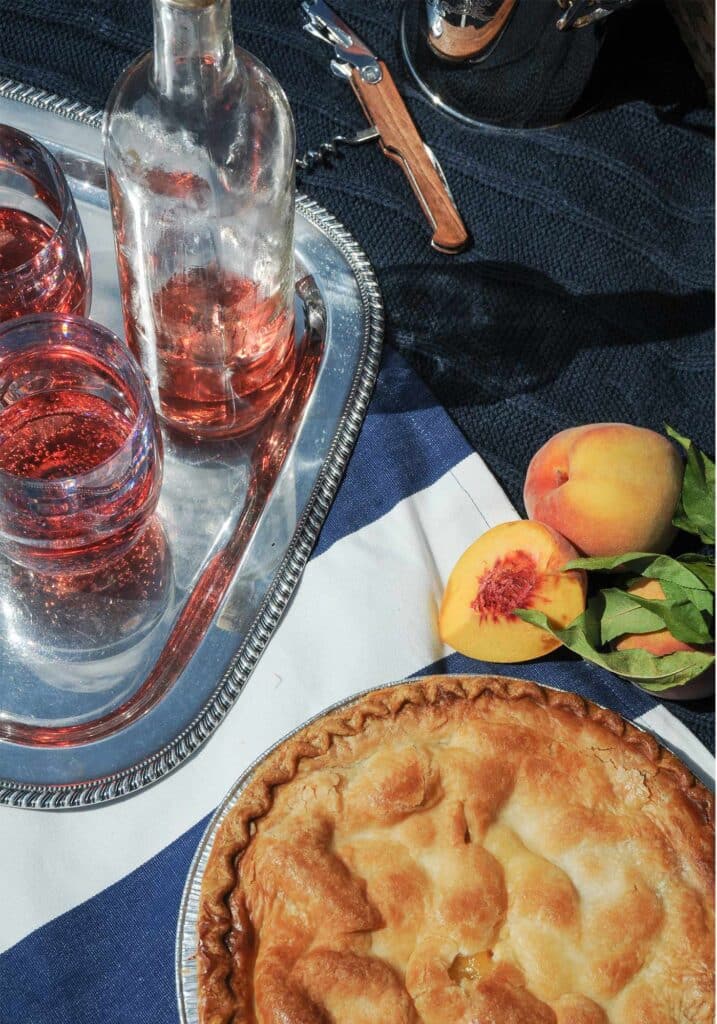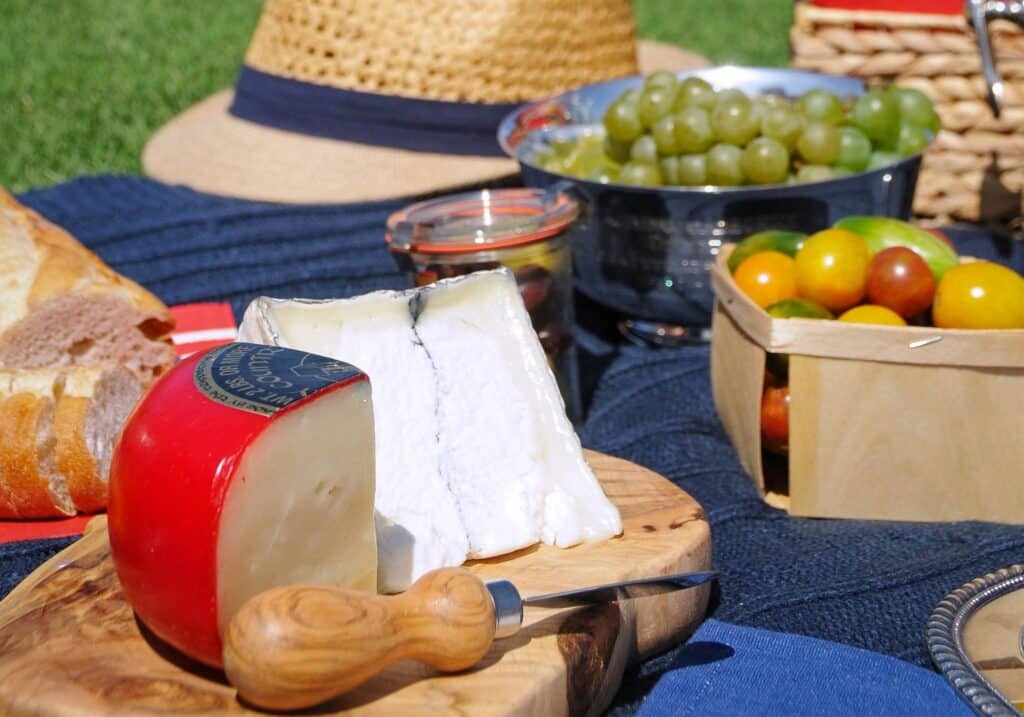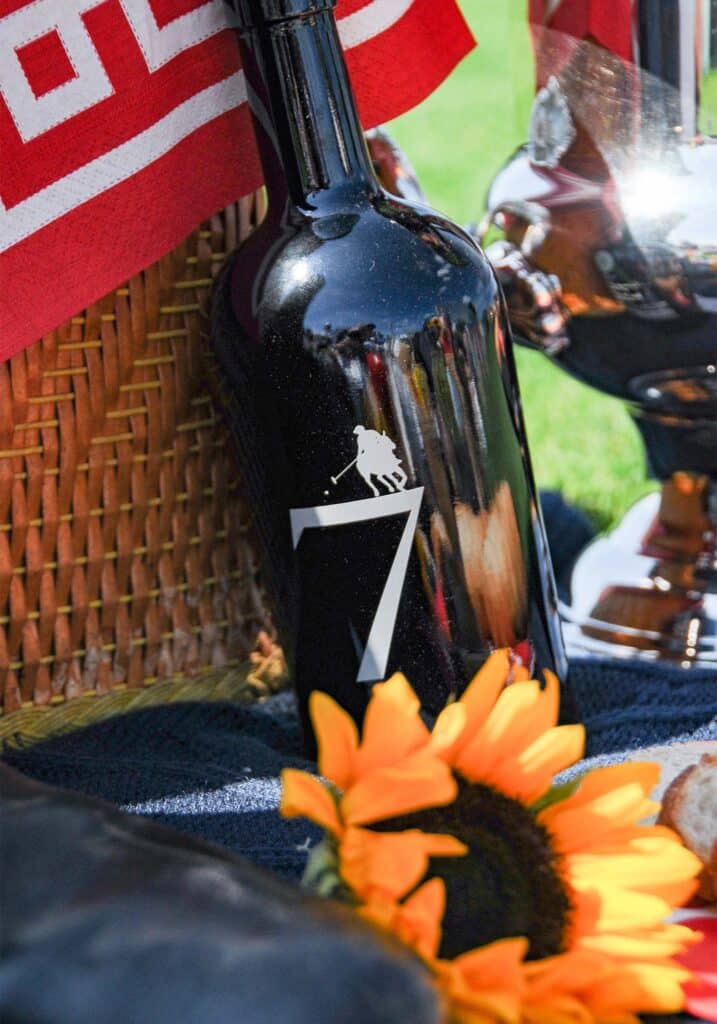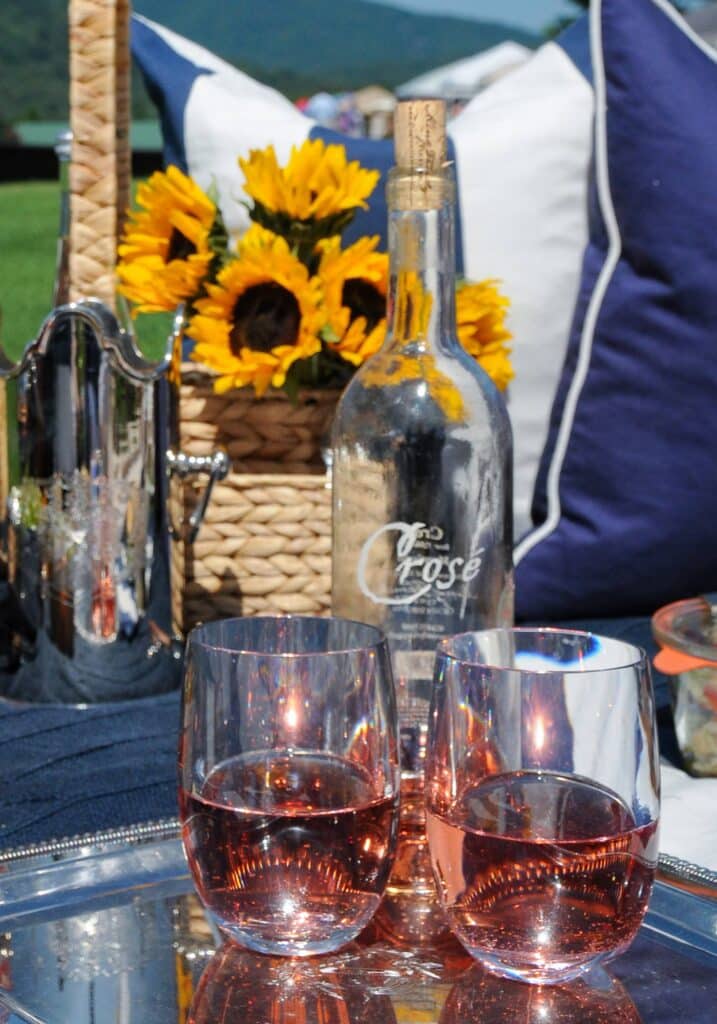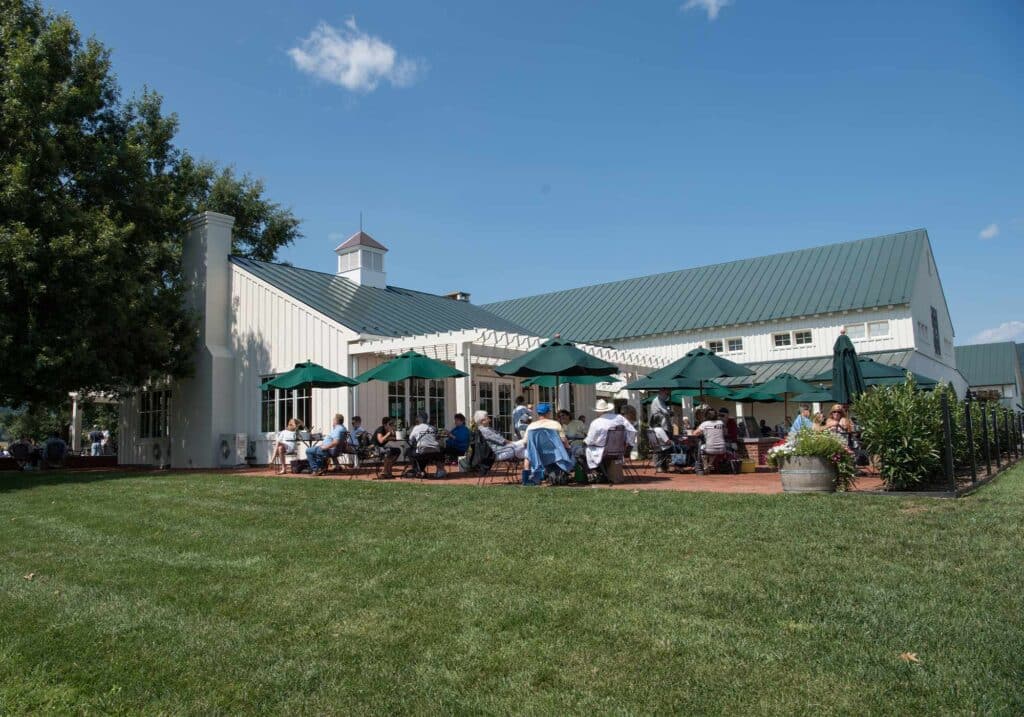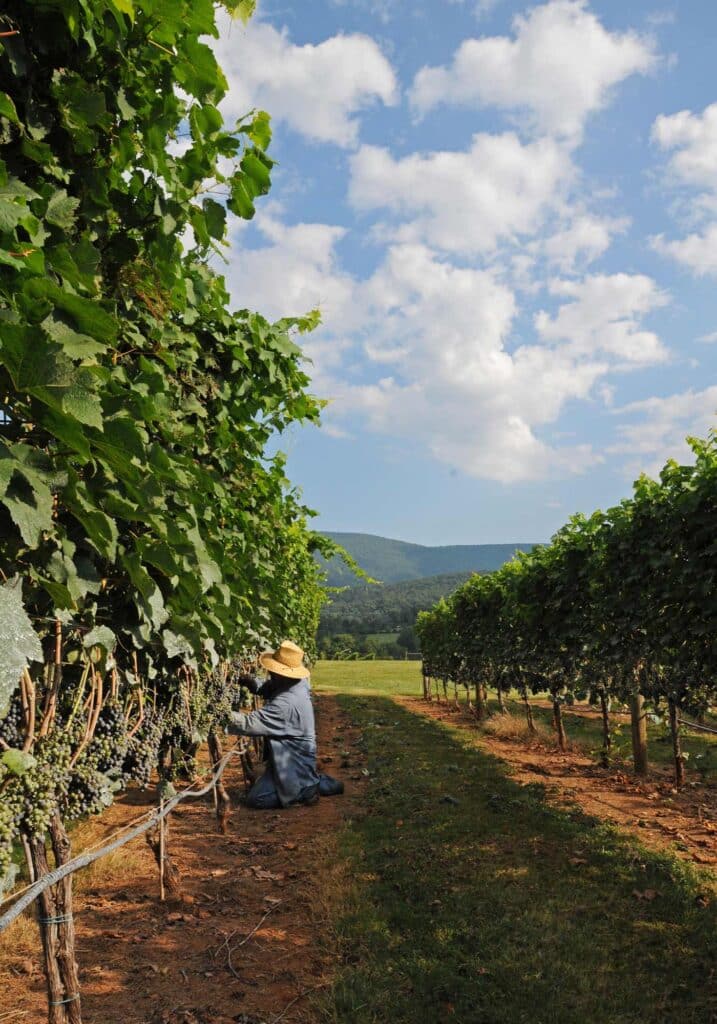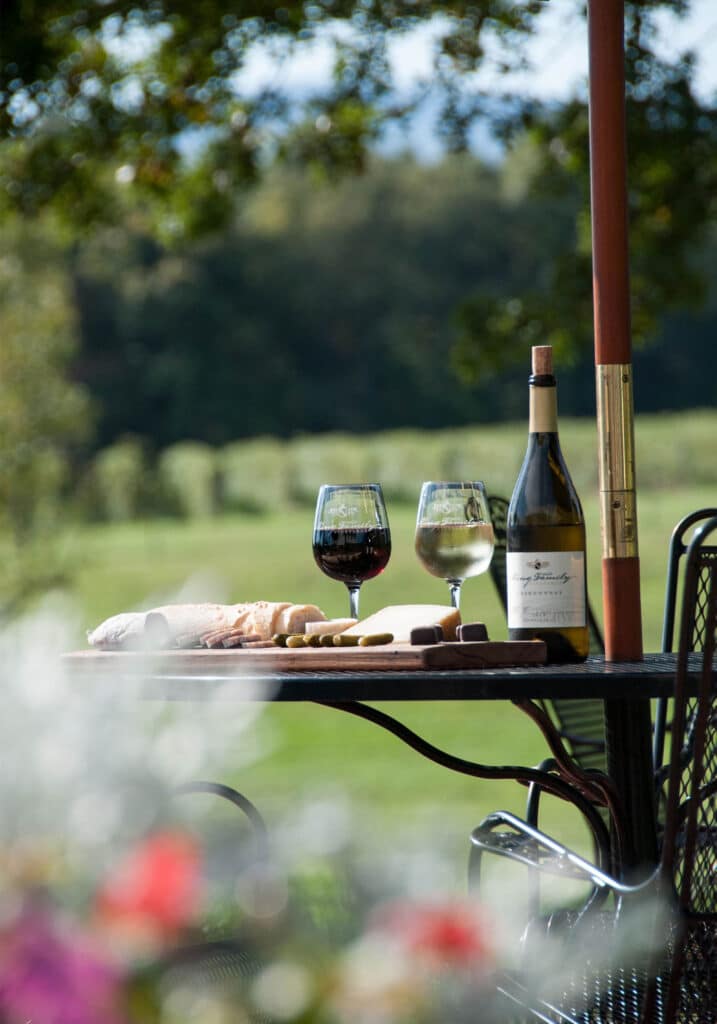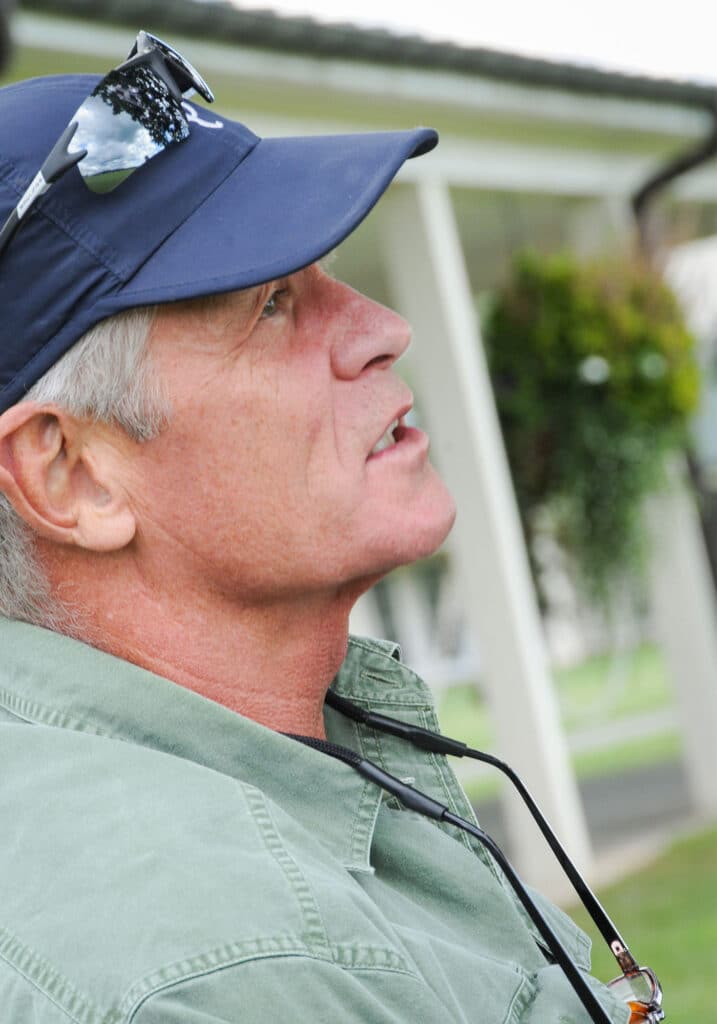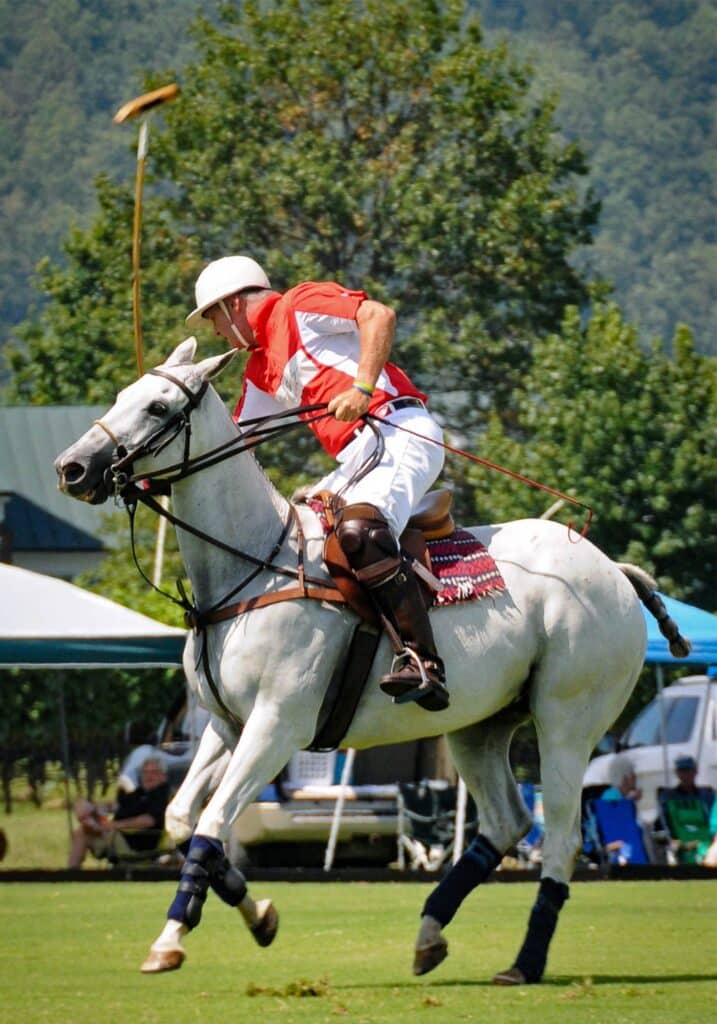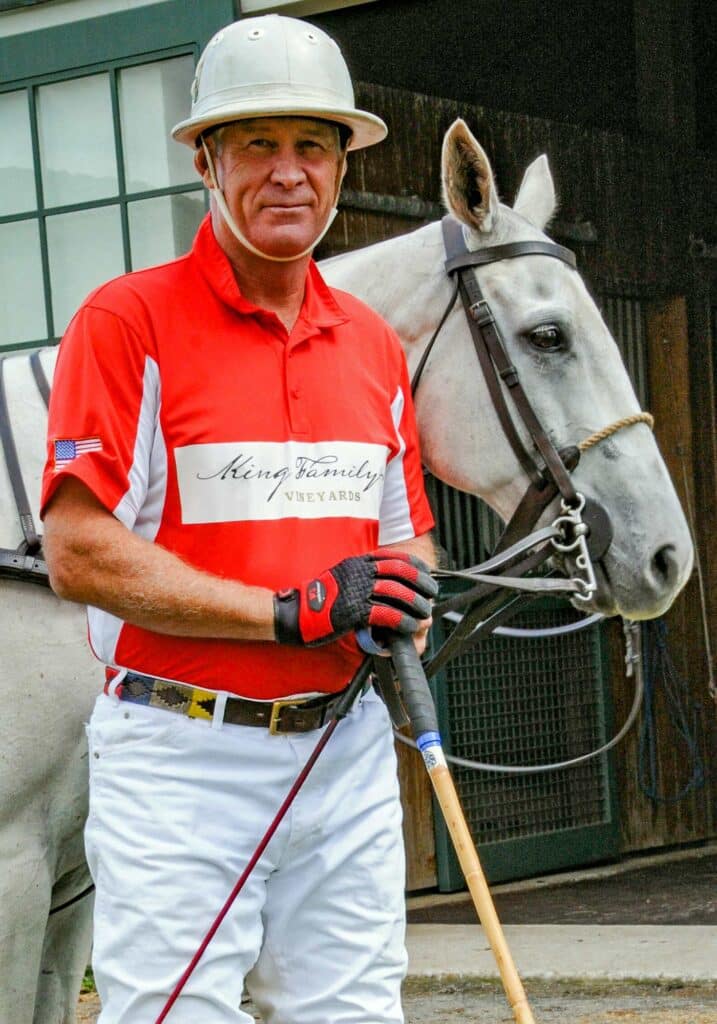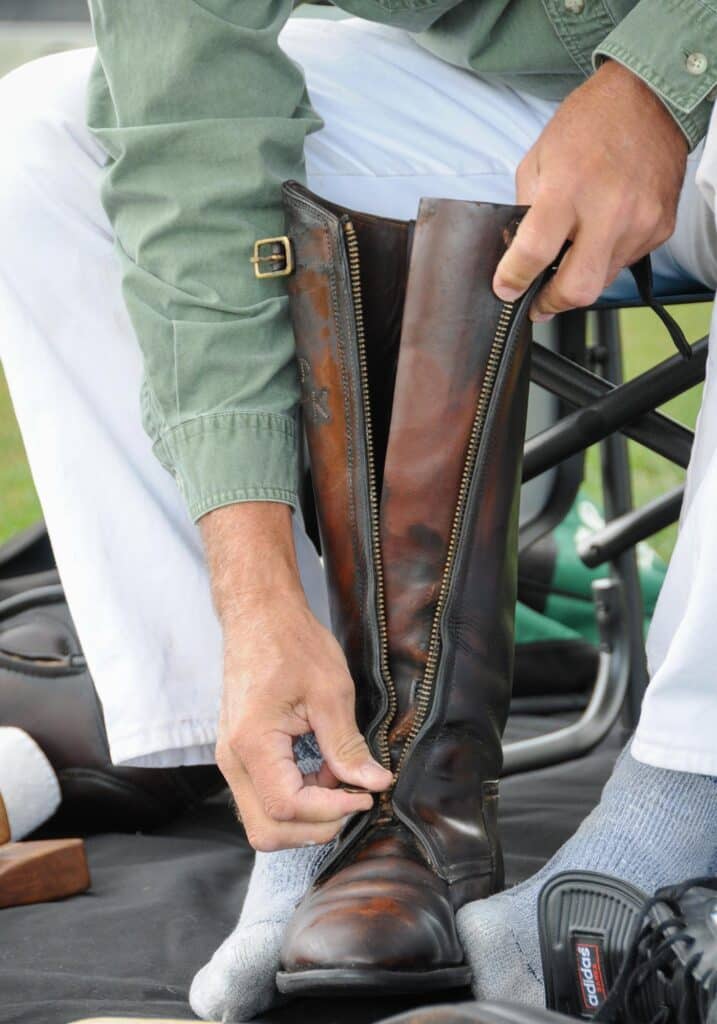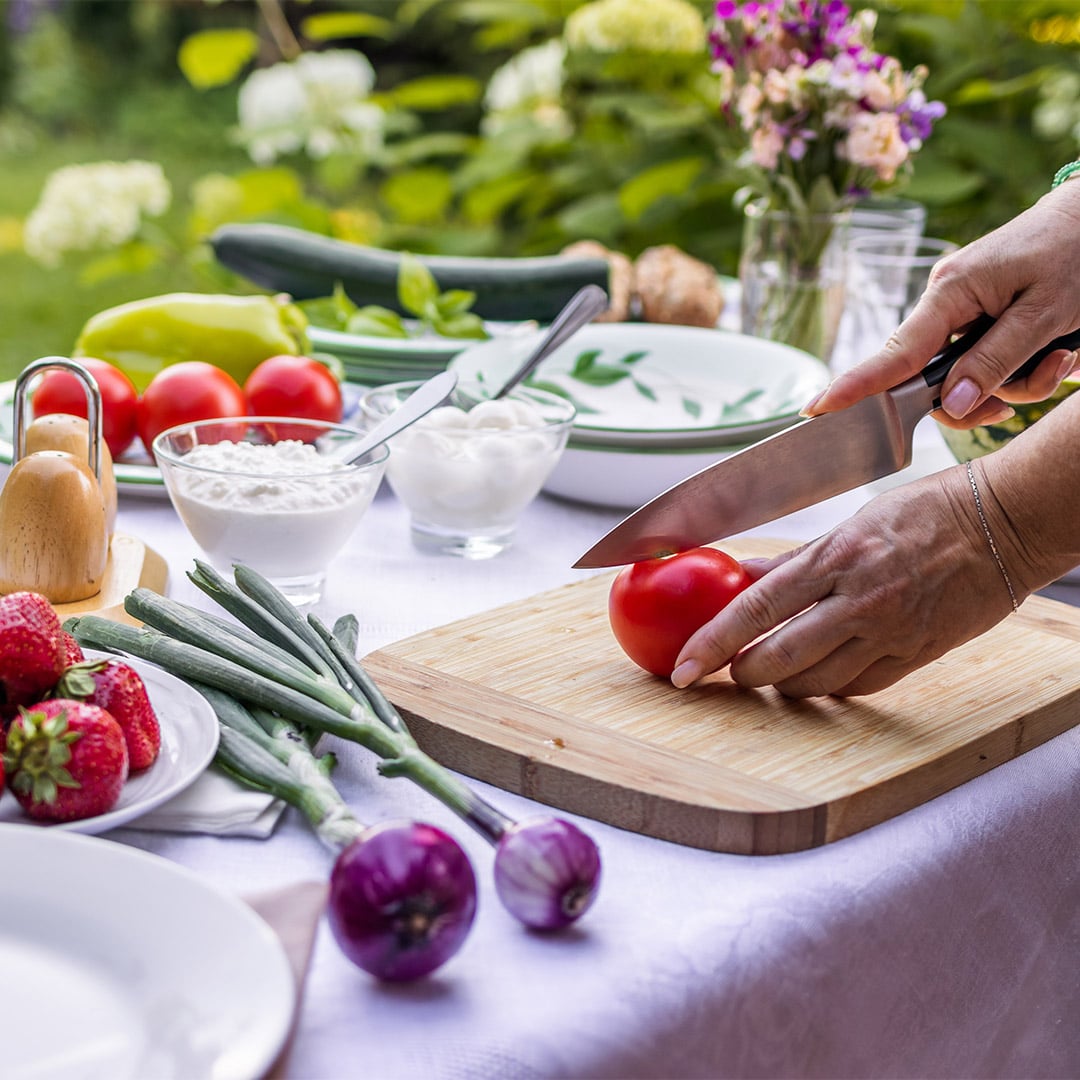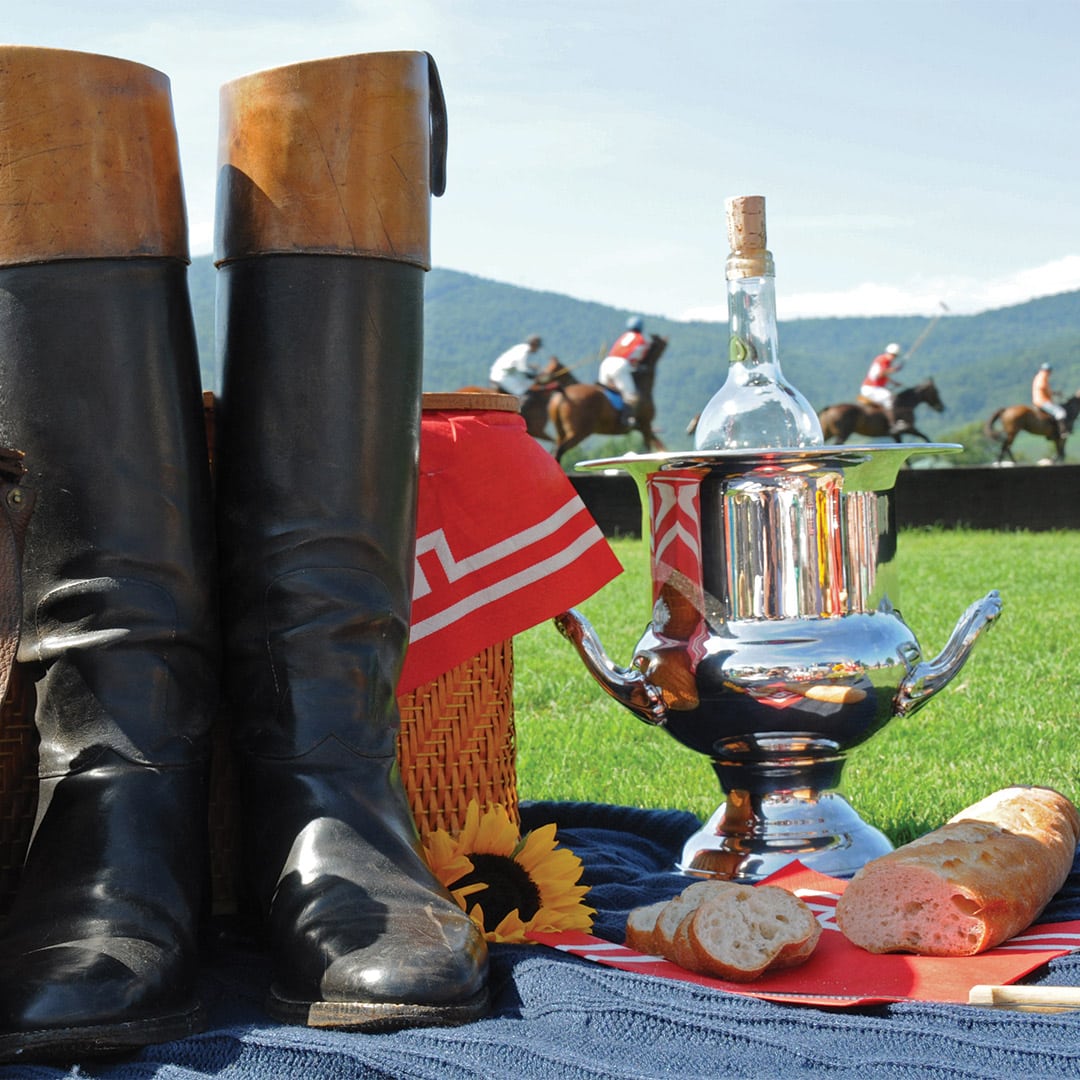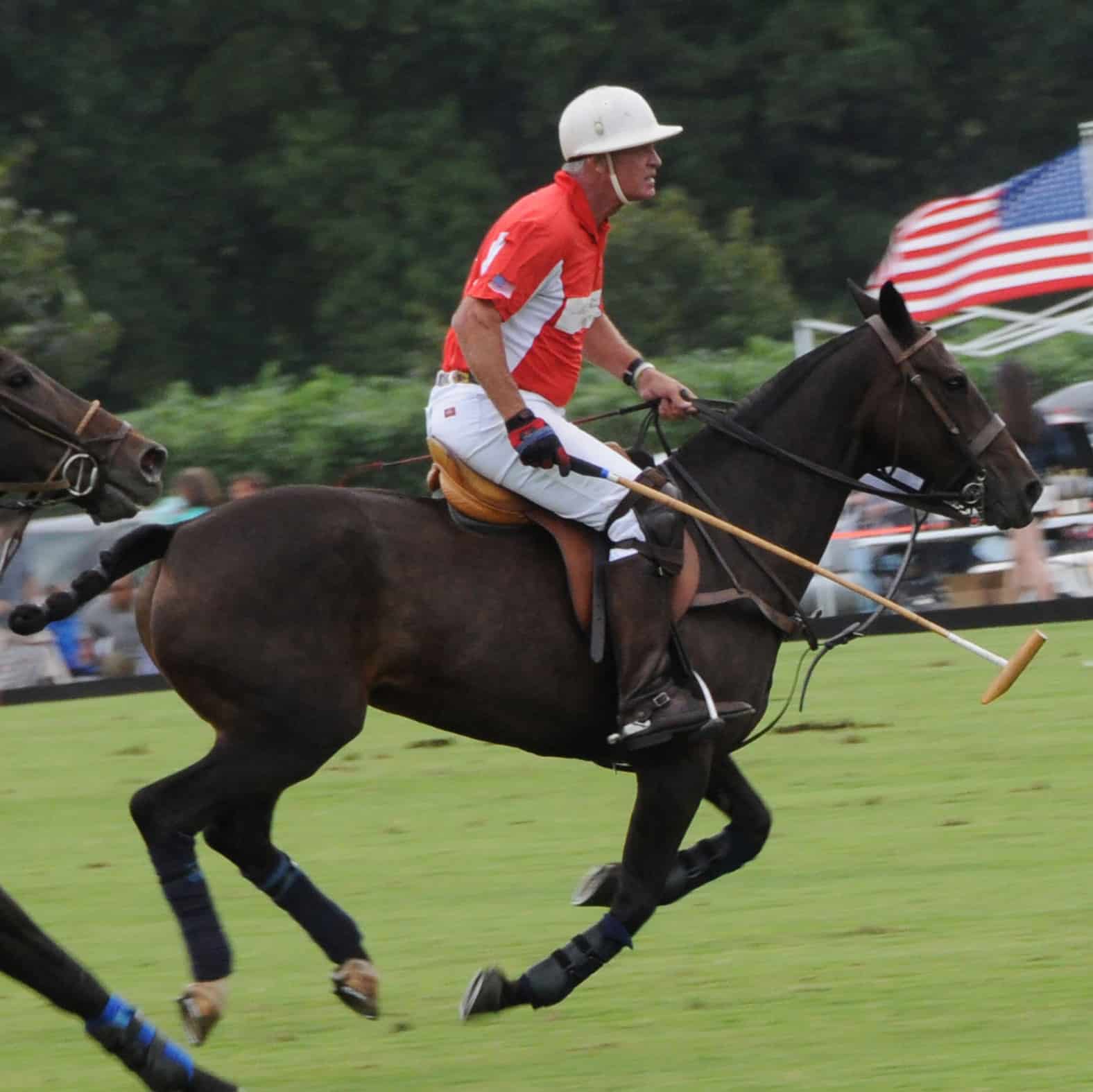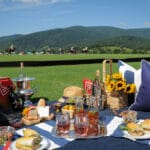Every tradition has a beginning, including Roseland Polo at King Family Vineyards near Charlottesville. The historic sport of polo traces its origin back to ancient Persia (now Iran) sometime between 600 BC and 100 AD. This polo sport for man and horse is played worldwide with the majority of clubs in the United States, Argentina, India and Western Europe. It is often associated as the sport of royalty the world over, and is most famously played by the men of the British royal family.
In the U.S., polo has been iconized by the high-end designer, Ralph Lauren and Nacho Figueras, a world-renowned Argentine polo player and fashion model with Ralph Lauren. In Charlottesville, Sunday polo matches can be found just west of town under the leadership of the King family. Located at the family’s highly-acclaimed King Family Vineyards, The Roseland Polo Club holds matches with open admission each Sunday from June through mid-October. Each weekly match draws several hundred spectators to the polo field. Sunday polo is a family-friendly event and some will dress up fashionably and some will enjoy the matches in casual attire (no dress code is required). Spectators at King Family Polo encircle the field in festive tailgating fashion to watch friendly competition, to enjoy their polo picnics, the good company of friends and family and to savor the vineyard’s wines.
What Happens at a Polo Match
As the days grow longer and the Blue Ridge Mountains transform from the golden browns of winter into the lush verdant mountain-scape of summer, King Family Vineyards opens its gates to the time-honored tradition of Sunday Polo.
The game of polo is a magnificent sight, one filled with finesse, strategy and athleticism.The crowd gathers around the polo field preparing for the match before them with excitement in the air. Tents go up and blankets are spread out with picnic foods for kids and adults alike. There is even a golf cart circling the polo field with chilled bottles from the winery that you can buy.
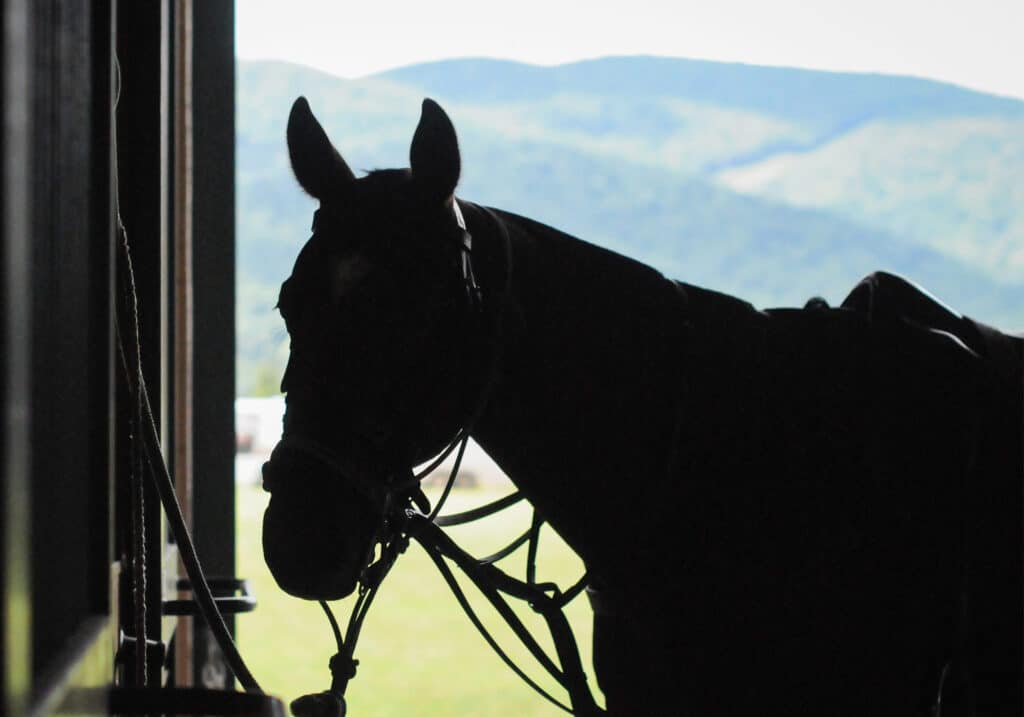
Sunday morning brings dew on freshly mown grass, the rising sun illuminates the mountaintops, and the sound of tires crunching on gravel sets the backdrop for a day on the polo fields. Trailers carrying the horses line up along the far side of the polo field. Saddle racks drop from the side doors of trailers. Horses are tethered to the outside of the trailers and polo players begin the routine of preparing the polo ponies for the upcoming match.
Well over an hour before the opening whistle, chairs and blankets are already set up for an afternoon of picnicking at Sunday polo. Neither the length of the match nor the weather hinder the weekly outing for regular attendees. When the gates open at 10 in the morning, cars roll through the winding pathway up to the polo field. Tailgates open and picnics are set up to reveal sophisticated picnic-fare, replete with local charcuterie boards, accoutrement, and personal cakes.
It’s polo season for Roseland Polo at King Family Vineyards.
From Memorial Day weekend through mid-October, King Family hosts Roseland Polo matches. The matches are free and open to the public, no reservation required. There are scarce few ways to better spend Sunday afternoon. While lots of adults come to watch, families with kids enjoy polo matches too.
Polo Ponies & Polo Gear at King Family Vineyards
In the barn or by the side of the trailer, equestrians brush their ponies, pick dirt out of the hooves, and wrap their legs with polo wraps. Each piece of equipment is as stylish as it is practical. Every detail is accounted for.
Polo wraps provide protection from any accidental nick from the polo mallets and also offer support for the tendons and ligaments as the ponies gallop at full speed across the field. The ponies are spritzed with bug spray. Tails are braided and folded into a mud knot to ensure they don’t get tangled or snag on anything.
At the end of a match, a polo ball, which is filled with air, is left with marks and indents where the mallets hit it and release air pockets. When hitting the ball, a player usually uses both flat sides of their mallet (unlike croquet which uses the mallet’s end). The shaft is made with an especially strong variety of bamboo.
Once ready, riders mount their ponies and grab their polo mallet, a long thin tool used for hitting the polo ball. Polo mallets are typically made from bamboo, a supple material that gives and bends when swung. Each player has their preference on the cane flexibility for their particular swing. Mallets are embellished with paint that matches the team colors and often adorned with the individual rider’s initials.
Players must first be advanced and seasoned riders before learning the sport, and that the ponies are no exception. Training a polo pony begins around age 3, and actual play could begin as early as age 5. However, it relies heavily on the pony’s skill level and abilities in knowing when each is ready to join the team. “We’re training the ponies to do things that don’t come naturally to them,” explained King. “A polo pony needs to learn to rush at or bump against other ponies and to manage the short and quick maneuvers involved in the sport. Some ponies take to it enough to tolerate it, some love it and others just aren’t cut out for it.”
The polo ponies ridden in polo matches are in fact horses, not ponies. Equestrians use the traditional term “ponies” in reference to the animals’ agility, rather than their size. Most polo ponies seen on the field are thoroughbred horses, a breed known for their athleticism. Thoroughbreds have powerful hindquarters and the burst of speed they provide gives riders a competitive edge on the field.
Polo 101: Polo Rules and Etiquette
Each polo match lasts about two hours. It is broken up into seven-minute chukkers, or periods, with a ten-minute halftime. During the match, the four players on each team attempt to get the polo ball through the opposing team’s goal.
This fast-paced, contact-heavy sport has evolved since it originated in ancient Persia (now Iran) sometime between 600 BC and 100 AD. Today, “contact” rules are used for the safety of the players and the horses when riders are attempting to reverse the ball’s direction. For example, an opponent can initiate shoulder-to-shoulder contact to push the offender off the line, they can hook the offender’s mallet, and they can bump others with their pony or steal the ball.
Horses gallop across the field, hooves unearthing patches of grass; a player’s mallet makes contact with the polo ball, and rider and horse race after it, trying to send the ball through the goal before an opponent can reverse the ball’s direction.
And it’s more than just having the capabilities to ride the polo pony across the field; it’s about having the ability to anticipate. “Every player and referee must be prepared to anticipate what could happen next,” King noted. Having played the sport for 30+ years, he shared that the most challenging part of the game is “to ride the horse well enough to get you to where you need to be, adjusting to the movement of the ball, and to be able to take a shot or make a pass with the ball.” Given all the components of ponies, players, swinging mallets and one tiny white ball roughly 5 feet below the riders, one can imagine the immense challenge and skill involved.
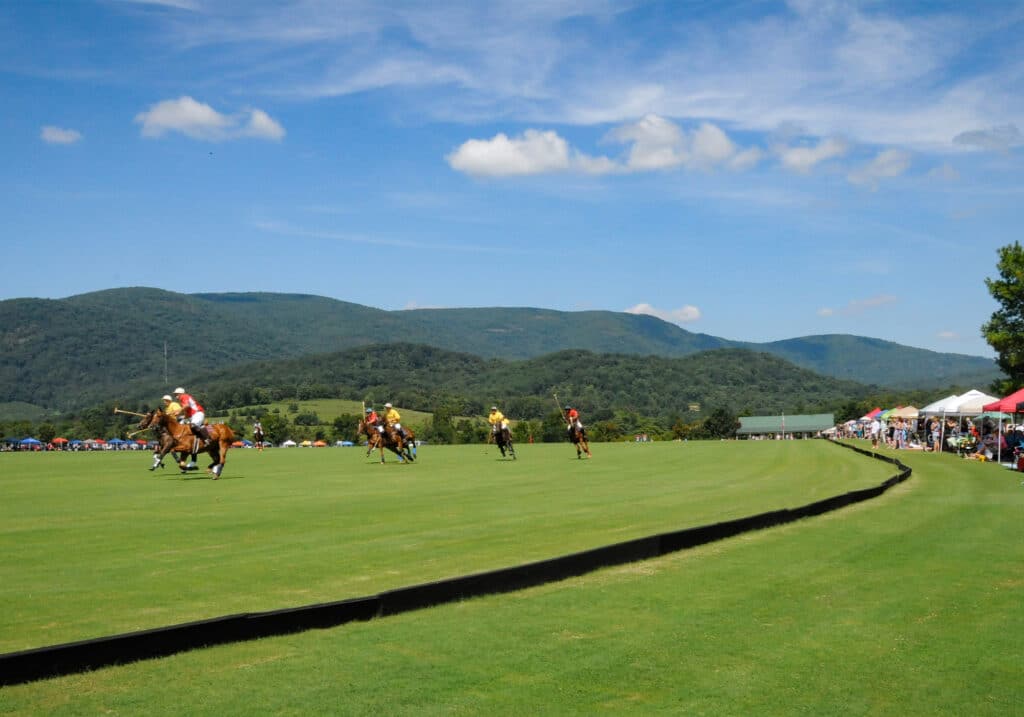
The safety of not only the riders but also the ponies is the most important goal of the referees. Of course like any other sport, there are sometimes injuries. King testified to the truth in this statement. He suffered a broken right shoulder during his time playing at the Houston Polo Club.
At the end of every chukker, riders will switch ponies out to lessen the pony’s chance of heat exhaustion. Every polo player uses multiple ponies throughout one match and brings an extra pony in case one cannot play that day. If the score is tied at the end of the six chukkers, a seventh is played to establish a winner. Fans of King’s lovely fortified red wine named “7” will now understand the reference.
The Scoring System for Polo
Even for newcomers to the polo sport, the scoring system is easy to follow. Each time a team scores a goal, they receive a point, and the polo team with the highest number of points wins the match. During every chukker, the teams switch directions. If the score is tied at the end of the six chukkers, the polo match will extend for a seventh to determine the winner.
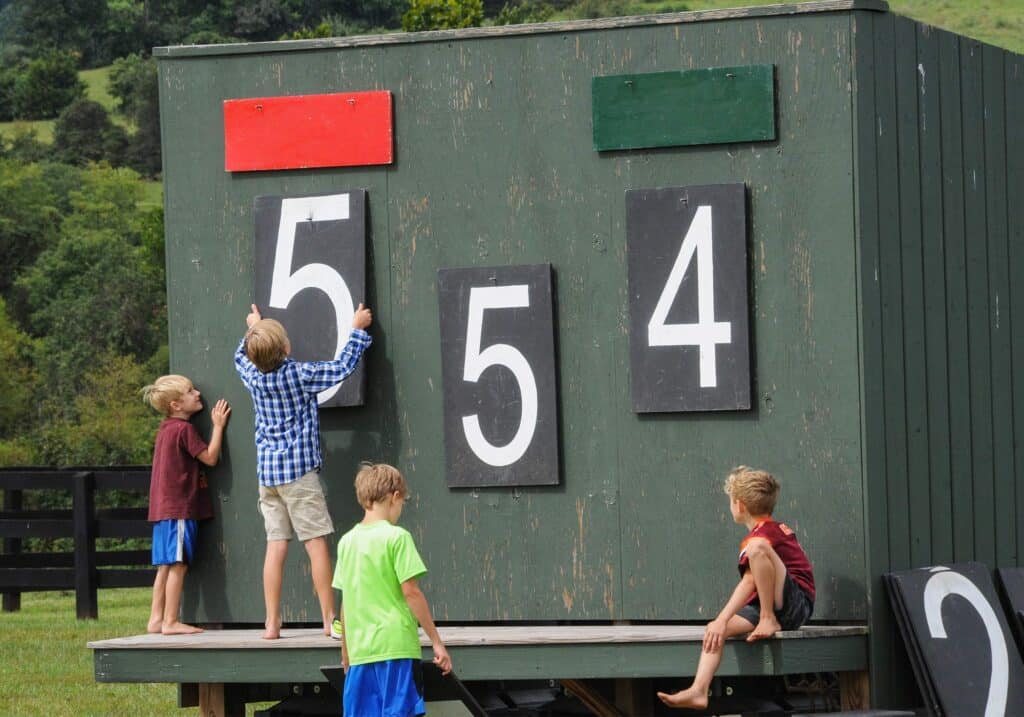
Polo is a team sport that requires synchronicity not only between polo pony and rider but amongst all four (eight including the ponies) members of the team. The positions each demand unique skillsets that must meld and work together throughout the match. Position 1 is an attacking offensive position that requires a rider who is adept at hitting the ball with accuracy and strength. They are the primary goal scorer. Position 2 is similarly an offensive position. Position 2 must provide critical support to Position 1 and also take on defensive responsibilities midfield.
Position 3 is akin to the quarterback and is typically held by the best player on the team. The player in Position 3 must have the ability to rocket the ball upfield to Positions 1 and 2 without inadvertently delivering the ball to the opponent’s team. Defense is the name of the game for Position 4. The player must be comfortable protecting the goal and also able to turn the ball back over to the team’s offensive players.
Stomping the Divots at Sunday Polo
Halftime at King Family Vineyards brings about the time-honored tradition of Stomping the Divots. Spectators flood the field and help overturn the patches of grass unearthed by the stampeding hooves of the ponies. Adults and children alike relish in the fun moment when they are invited onto the field to righten the freshly upturned dirt.
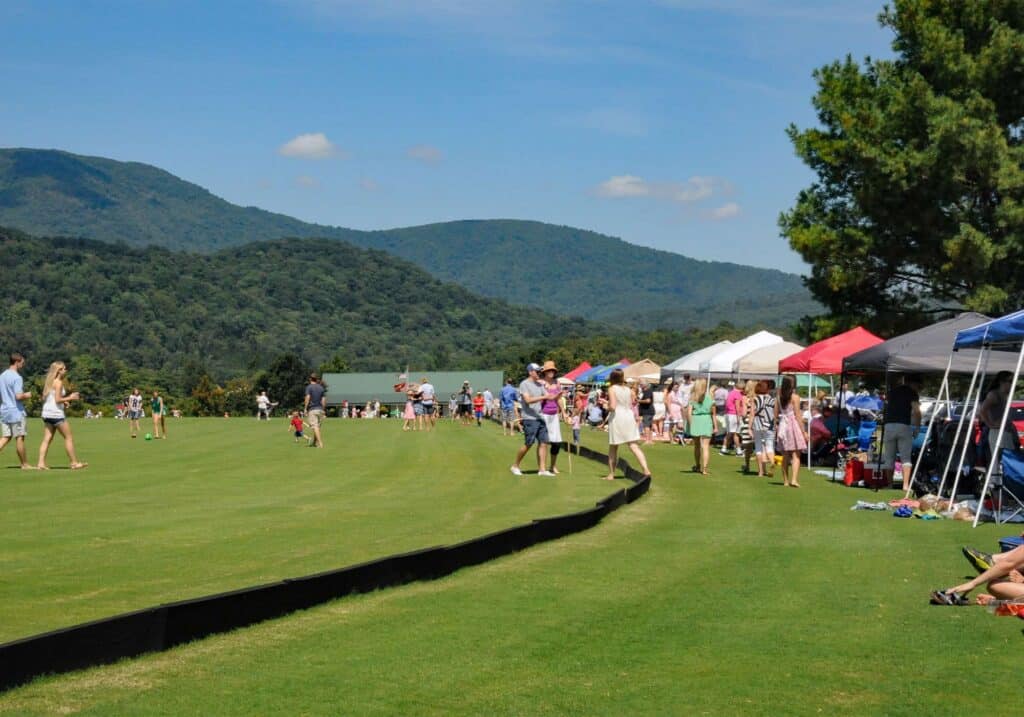
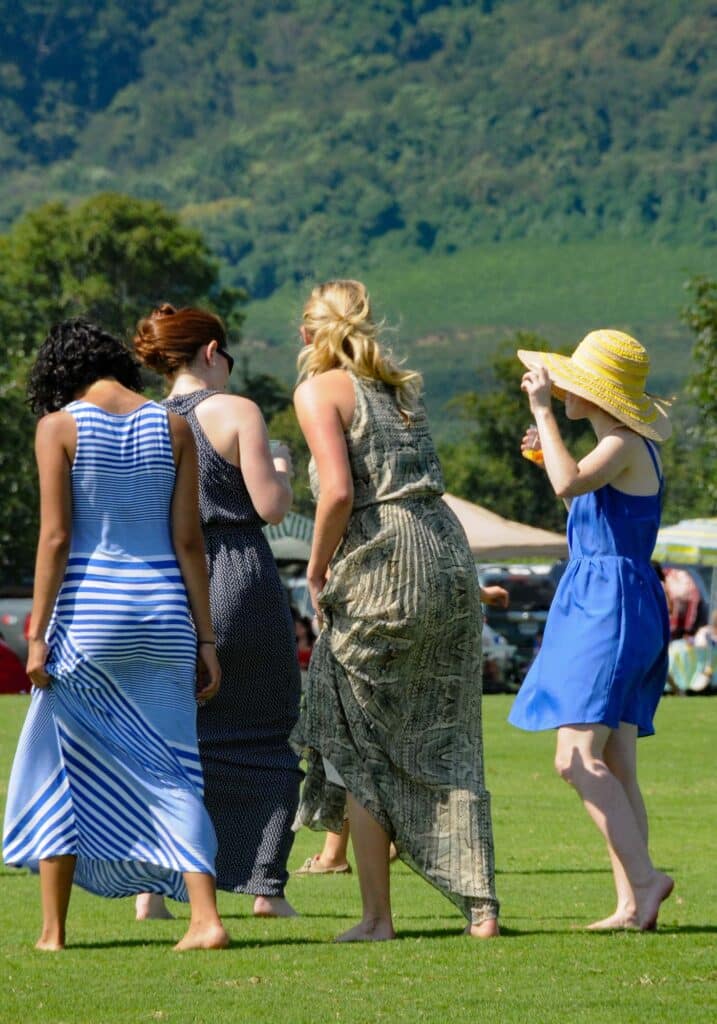
Stomping the Divots is an enjoyable tradition because it engages the crowd, but it also serves an important purpose. Righting the divots ensures that the ball can move quickly and accurately across the field and reduces the chance of injury from a pony tripping.
Sunday Polo Match Picnic
Polo at King Family Vineyards is not complete without a beautiful picnic spread. For this year’s picnic, we brought along the familiar favorites. A sandwich from Belair Market is a must and nothing says summertime like peach pie from Chiles Family Orchard, just up the road from King Family. Hot summer days demand a glass of homemade iced tea. Cheese from Our Lady Monastery in Crozet pairs perfectly with a baguette from Market Street Market.
The Winery at King Family Vineyards
Golf carts cruise along the outside of the polo field selling King Family Vineyards’ wines for spectators to purchase without ever leaving the comfort of their pop-up picnic spread. Of course, the ever-popular Crosé Rosé is the ideal rosé for a drink while in Crozet, especially while watching a polo match. The dry, Merlot-based rosé is crisp, fresh, and deliciously drinkable.
Another favorite is the King Family Petit Verdot, the Seven. This oaky wine is aged in bourbon barrels and has notes of blackberry, plum, and chocolate. The name of the wine is an ode to the Seventh chukker in a polo match, the tie breaker round. The clean and elegant label shows a polo player on top of the number 7.
Wine at the King Family Vineyards Tasting Room
A short stroll from the polo field, the King Family Vineyards Tasting Room welcomes patrons to have a sampling of the wines available for purchase by the bottle or glass. Guests can sit in the shade on the patio and see the polo matches unfold in the distance.
The Tasting Room also includes a gift shop that sells supplies to help bolster any picnic.
The King Family of King Family Vineyards
King Family Vineyards, Roseland Polo and the growth of the Virginia Wine Council are the legacy of David King. When the Kings arrived in Virginia from Houston, Texas in 1996, it was important to them to find a property that would suit a polo field for Roseland Polo. With the number of rolling hills in our region, it was not an easy task. But, they found just the place on the farm property we all know as Roseland Farm.
It wasn’t until later when they were approached by a viticulturist who pointed out that the property would grow excellent grapes for making wine that the family considered getting into the vineyard business. Stemming from King’s vision and commitment to excellence, Roseland Farm’s polo field is now surrounded by nearly 30 acres of stunning vineyards. The popular winery produces just over 10,000 cases per year of some of Virginia’s finest wines. King was a leader in helping to grow the wine industry in Virginia and spoke often for the government’s support of Virginia wineries and improved legislation for viticulture and the sale of wine.
Prior to passing away in 2019, King, a retired lawyer, would dress for the day’s match in his usual spot under a small tree near the stables.
King participated in his first polo match in Houston, Texas, in 1980. This ignited a spirit, passion and competitive nature that makes his family proud. His first pony, “Mother Dumper,” was aptly named. He dumped King on the ground the first two times he rode him. King’s deep respect for polo sport drove him to ensuring its 18th-century traditions were upheld. And, for the horse enthusiasts who know their breeds, it should be clarified that polo players ride horses, but they still use the traditional term “ponies.”
King left behind a legacy that will endure for generations to come. His contributions to the Virginia wine community are outstanding. He planted the original vines that continue to flourish at King Family Vineyards today. He served as the Chair of the Virginia Wine board for seven years, and his mantra in all his endeavors was that “a rising tide lifts all boats.”
Roseland Polo also works closely with UVA’s Polo Club, whose ponies have been donated from all over the country. At each polo match at Roseland Farm, you can find a pony or two loaned for the game from the club. This “cooperative” relationship between the Kings and UVA’s intercollegiate, student-run program has been consistent over the years. And during the summer months, if UVA students are around, they can be seen joining in the Sunday matches at Roseland Farm. Watch our calendar for polo and other equestrian events.
Roseland Farm and King Family Vineyards is truly a family business. All three of the King’s sons and their families live on the property and work to grow the vineyard side. The Kings’ eight grandchildren can often be seen cheering on the players or manning the scoreboard. “We never take for granted the opportunity to wake up to the beautiful views we enjoy here every morning and to have all that we do,” Ellen King shares. “It is one of our greatest joys to share it all with our visitors—the view, the sport, the experience and the wine.” ~
See our Style & Culture page for more articles on Virginia polo, equestrian sports and other sporting life. Be sure to also read Northern Virginia Polo about the Virginia United Polo League and polo superstar Nacho Figueras in Northern Virginia hunt country. For more information about King Family Vineyards’ award-winning wine learn about their fantastic year at the 2024 Virginia Governor’s Cup and the 2024 Monticello Cup.
This article appears in Book 2 of Wine & Country Life and is regularly updated for each season, Start your subscription here or give a gift subscription here.
Our senior editor writes for all of our publications and websites and has degrees in English and journalism with a master’s in HR. She enjoys writing about Virginia wine country.
ABBY MEREDITH ARMISTEAD is a Double Hoo who loves all things Charlottesville and equestrian. Abby grew up competing through the Arabian Horse Association. She found success as a four-time Youth National Champion. During college, Abby made the switch to Hunter Jumpers and competed throughout Virginia. Abby worked as an attorney in Washington, D.C. and now is a freelance writer living in Charlottesville. She spends her weekends hiking with her dog in the Blue Ridge Mountains, frequenting the farmers’ market and reading any novel she can get her hands on.
R. L. JOHNSON is our co-publisher and creative director, Robin Johnson Bethke, Bethke began her career as a professional photographer in Los Angeles before moving into graphic design and art direction when she relocated to Charlottesville in 1994. As our company’s co-founder and visionary, she enjoys all aspects of the publishing process from story conception to graphic design to photography.

